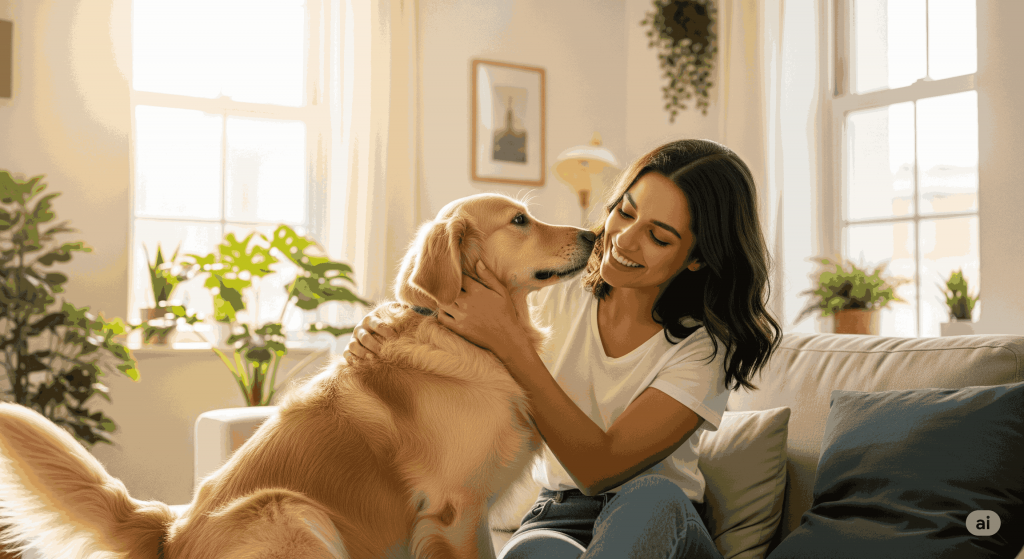How to Maintain Hygiene while Caring for Your Pet?

There’s nothing better than coming home to a wagging tail or a purring companion. Pets bring joy and unconditional love—but they also bring fur, muddy paws, and occasional accidents. That’s where pet hygiene tips come in handy.
Good hygiene keeps your home clean, reduces allergens, and protects the health of both your pets and your family. With a few smart routines, you can enjoy a happy pet without sacrificing a healthy home.
Maintaining cleanliness not only keeps your home tidy but also supports the health of both pets and humans. By adopting a few simple pet hygiene tips, you can create a safe, hygienic environment for your entire family.
Why Pet Hygiene Matters for Your Health?
We’ve all been there—snuggling with our dog on the couch only to realize later that our black pants are now covered in white fur, or getting an enthusiastic “kiss” from our cat right before dinner. While these moments make for funny memories, they also highlight why pet hygiene is about more than just keeping our homes looking neat.
Pets, like people, carry bacteria and allergens naturally. A study from the National Institutes of Health found that while pets do expose us to microbes, many of them are actually beneficial for immune health—especially in kids. However, some germs (like salmonella or parasites) can make both pets and people sick if not managed properly.
That’s why understanding pet hygiene practices is essential for every pet owner. With some mindful habits, you can enjoy all the cuddles—without the health risks.
Essential Pet Hygiene Tips for Clean Hands
Let’s start with the most basic (and most effective) habit: handwashing. You don’t need to scrub like a surgeon after every pat on the head, but there are key times when it really matters:
- After cleaning up accidents (whether it’s a litter box, cage, or that unfortunate chewed-up shoe)
- Before eating or cooking (because nobody wants pet hair in their pasta)
- After outdoor playtime (mud, grass, and who-knows-what-else can hitch a ride on paws)
A quick 20-second wash with soap and water does the trick. Keep a bottle of hand sanitizer near the back door for those times when your hands are full with leashes, grocery bags, and an overexcited pup.
Daily Pet Grooming Tips for Better Hygiene
Some pets love water. Others… well, let’s just say bath time becomes an Olympic-level escape challenge. Developing consistent daily routines forms the foundation of effective pet hygiene management. Here’s how to keep them fresh without the drama:
- Brush regularly. A quick daily brush cuts down on shedding and dander. Pro tip: Do this outside if possible to keep loose fur from floating around your living room.
- Wipe paws after walks. A damp towel by the door saves your floors from dirt and reduces what they track through the house.
- Bathe only as needed. Overbathing can dry out their skin. Most dogs do well with a monthly bath (unless they’ve rolled in something questionable). Cats? They usually handle their own spa days.
Home Environment and Surface Cleaning
Maintaining a clean home environment is essential for pet owner care and overall family health. You don’t need to transform into a full-time maid to keep a pet-friendly home clean. Incorporate these home hygiene tips for pet owners:
1. The Magic of Designated Pet Zones
- Give your pet their own cozy bed (so they’re less tempted to claim your couch).
- Keep food and water bowls in an easy-to-clean area (like a mat that catches spills).
- If allergies are a concern, make bedrooms pet-free zones for better sleep.
2. Winning the Battle Against Fur
- A rubber broom or squeegee works wonders for lifting pet hair from carpets and furniture.
- Vacuum 2-3 times a week (or daily during shedding season). A vacuum with a HEPA filter traps allergens.
- Throw blankets over favorite pet nap spots—they’re easier to wash than entire sofas.
3. Odor Control That Actually Works
- Baking soda is your friend. Sprinkle it on carpets before vacuuming to neutralize smells.
- Wash pet bedding weekly in hot water.
- For accidents, enzyme-based cleaners break down stains and odors instead of just masking them.
When to Take Extra Care
Most healthy adults don’t need to stress over every germ their pet carries. But there are times to be extra mindful:
- If someone in your home has a weakened immune system, talk to their doctor about precautions.
- Pregnant? Avoid handling cat litter due to toxoplasmosis risk.
- New puppy or kitten? They’re more prone to parasites, so keep up with vet visits and wash hands after playtime.
Conclusion: Healthy Pets, Healthy Families
At the end of the day, pets make our lives richer—even if they occasionally track mud across the kitchen or steal socks. By building these essential pet hygiene tips (like handwashing, regular grooming, and smart cleaning routines), you can enjoy all the fun of pet ownership without turning your home into a sterile bubble.
Because really, what’s better than a happy, healthy pet curled up next to you—without the worry of what they might have brought in from the backyard?
Now, go give your furry friend some love (and maybe check their paws before they jump on the bed).
FAQs
The best pet hygiene tips for a clean home include brushing your pet daily to reduce shedding, wiping their paws after walks, regularly vacuuming with a HEPA filter, and washing pet bedding weekly. Using enzyme-based cleaners and baking soda also helps control odors.
Managing pet odors involves regular washing of pet bedding, using enzyme-based cleaners for accidents, and sprinkling baking soda on carpets before vacuuming. Also, maintaining your pet’s grooming schedule helps minimize odor at the source.
Quick pet hygiene routines include brushing your pet for a few minutes daily, wiping paws after outdoor walks, refreshing water bowls, and doing a quick check for any dirt, ticks, or odors. These routines take less than 10 minutes but make a big impact.
In apartments, focus on regular grooming to minimize fur, using odor-neutralizing sprays, and setting up a designated potty area (for small pets). Vacuum frequently and ensure pets have clean bedding and toys to avoid the buildup of dirt and germs.
